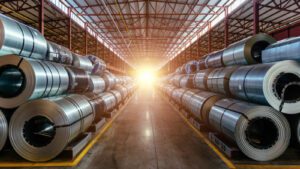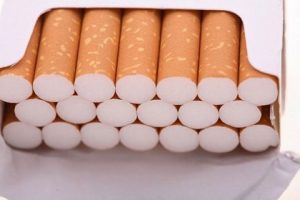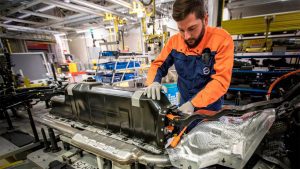
European producers, faced with a surge in energy prices, are shifting operations to the United States, hoping to take advantage of both greater stability in the US energy market and government incentives, The Wall Street Journal writes.
Experts warn of the possibility of a new wave of deindustrialization in Europe amid wild energy price fluctuations and persistent problems in supply chains. The operating environment in the US looks much more favorable, especially for chemical manufacturers and companies in other energy-intensive industries. In August, US President Joe Biden signed the Inflation Reduction Act (IRA), which provides, in particular, tax incentives for industrial companies and representatives of the green energy sector.
Earlier this month, the WSJ reported, citing sources, that American electric car maker Tesla Inc. paused a plan to manufacture batteries in Germany in connection with the possibility of obtaining tax benefits in the United States. Sources told the paper that Tesla is considering shipping battery manufacturing equipment to the States for its Berlin facility.
European companies that have announced expansions in the US this year include automaker Volkswagen AG, as well as, for example, the Dutch chemical company OCI NV, which owns an ammonia plant in Texas.
European steelmaker ArcelorMittal SA earlier this month announced it was cutting production at two plants in Germany. At the same time, the results of her Texas enterprise turned out to be better than expected, which the head of the company, Aditya Mittal, explained by the low cost of energy in the region.
Experts note that the US economy has weathered the pandemic fairly well and is more attractive for business than Europe and China, despite record inflation, continued problems in supply chains and the risks of a recession as a result of tightening monetary policy by the Federal Reserve System (Fed). China is still under lockdown to contain the spread of COVID-19, and Europe is destabilized by the energy crisis due to the conflict in Ukraine.
It will be difficult for European manufacturers to remain competitive without lower energy prices or government subsidies, said Svein Tore Holseter, chief executive officer of Norwegian chemical company Yara International ASA.
“Some industries will have to relocate production on a permanent basis as a result,” he said.

The capacities of Ukrainian enterprises are sufficient to satisfy the need for roofing materials for the restoration of housing, social and critical infrastructure facilities affected by Russian aggression, Hanna Hontarenko, the acting director of the Ukrainian Steel Construction Center, told Interfax-Ukraine.
“Based on the results of work of the operational headquarters for the provision of construction materials in the Ministry of Regional Development, the needs of each region for roofing materials necessary for the restoration of housing, social and critical infrastructure have been determined. The internal potential of enterprises producing roofing materials in Ukraine allows us to meet these needs as soon as possible,” she said.
At the same time, the expert added that since the end of February 2022, the construction sector and the metallurgical industry have undergone significant changes.
“The destruction and occupation of the capacities of the largest metallurgical plants Azovstal and Illich Iron and Steel Works, a reduction in demand in the domestic market, an increase in the exchange rate and the cost of logistics – all these factors led to an increase in the cost of rolled metal. Since the beginning of the year, the price for certain assortment items has increased by more than 30%,” she said.
According to her, due to the aforementioned factors, steel structures manufacturers work with a low level of loading, however, due to stocks in warehouses and the work of metallurgical enterprises in Zaporizhia, Dnipro, Kryvy Rih, there is no shortage of rolled metal.
“But the situation will change when stocks are exhausted for certain assortment items that cannot be manufactured in Ukraine, and then demand will have to be met through imports,” the expert says.
As for the issue of steel roofing, the raw materials for it, namely rolled products, are produced by Zaporizhstal. Galvanizing and galvanizing/painting is carried out at the facilities of Unisteel LLC (the design capacity is 100,000 tonnes/year) or Modul-Ukraine LLC (the design capacity is 200,000 tonnes/year).
HOUSING, INFRASTRUCTURE, MANUFACTURERS, RAUTA, roofing materials

The findings of the Supreme Court, which allowed Tedis Ukraine to satisfy the cassation appeal against the Antimonopoly Committee of Ukraine (AMCU) and invalidate the fine of UAH 3.4 billion, will also significantly enhance the prospects of cigarette manufacturers to revoke the decision of the committee on fines, according to lawyers interviewed by Interfax-Ukraine.
“Speaking of other tobacco trials, it should be said that the Supreme Court’s findings on the inconsistency of the Antimonopoly Committee’s decision with the rules of prejudice and evidence can significantly enhance the prospects of cigarette manufacturers to overturn the Antimonopoly Committee’s decision,” Asters law firm partner Oleksiy Pustovit said.
He recalled that the Supreme Court had put an end to the Tedis Ukraine lawsuit against the Antimonopoly Committee, invalidating the committee’s decision incriminating anti-competitive concerted actions by Tedis and cigarette manufacturers Philip Morris International (PMI), JT International (JTI), Imperial Tobacco (IT) and British American Tobacco (BAT).
“The decision is important both in terms of influencing the law enforcement practice of the Antimonopoly Committee as a whole and in terms of changing the balance of power in ongoing similar litigation between cigarette manufacturers and the committee,” he said.
The lawyer called the Supreme Court’s decision “brief and capacious at the same time.” In particular, according to the lawyer, the most remarkable position is the illegality of the committee’s use of its decisions and recommendations in other cases as adjudicated. Many of the committee’s findings were not established or examined on the basis of evidence, as required by law, but were taken from other cases in which participants, markets and circumstances differed. In addition, the committee’s decision also contained elements of letters of recommendation as evidence in the case, which was closed without establishing any facts of violation of competition law.
“The Supreme Court concluded that the Antimonopoly Committee, citing other decisions, did not in fact investigate the market itself, which is decisive for any antitrust case, while other decisions dealt with other markets. The issue of the illegality of the committee’s use of its decisions in other cases as adjudicated was raised by the manufacturers and Tedis at the stage of consideration of the case by the committee. From a legal point of view, such an approach is tantamount to charges without some hard evidence,” he said.
The lawyer said that similar arguments were used in the claims of the tobacco manufacturers.
“Following the decision of the Supreme Court, courts will most likely follow the position of the illegality of the committee’s decisions and recommendations made in other cases as adjudicated, in other cases under manufacturer’s claims, which enhances the manufacturer’s chances of winning disputes with the committee,” Pustovit said.
In turn, partner of the Legal Alliance Andriy Gorbatenko reminded that the Antimonopoly Committee imposed a fine on tobacco companies due to the fact that with the entry of Tedis Ukraine (formerly Megapolis-Ukraine) in 2010, the number of cigarette distributors began to decline sharply and by 2013 Tedis Ukraine was the only distributor to which cigarette manufacturers supplied their products. Following the investigation, the committee concluded that this circumstance was the result of anti-competitive concerted actions that concerned the elimination of other distributors from the market or restriction of market access to them. In particular, the Antimonopoly Committee found that cigarette manufacturers had identified unfeasible selection conditions for distributors, which even Tedis Ukraine did not meet.
However, the lawyer said that “the unfortunate decision of the Antimonopoly Committee does not contain exhaustive evidence that would unequivocally answer this question,” and the Antimonopoly Committee did not provide evidence of consistency between the actions of cigarette manufacturers and Tedis Ukraine.
“Could this decision of the Supreme Court be the basis for reversing the decision of the Antimonopoly Committee and some cigarette manufacturers? Definitely, yes. Given the position set out in the decision of the Supreme Court, the accusation of the Antimonopoly Committee in this case is as follows: there seemed to be some agreement to establish barriers for other distributors to enter the primary cigarettes market, but it is not clear who agreed on this and with whom and it does not mean that the conditions established as a result of such an agreement (if any) could really create a barrier,” the lawyer said.
Gorbatenko also said that “the rest of the charges are based on evidence that cannot be used because it was collected in other investigations.”
“The probability that the Antimonopoly Committee’s decision regarding the accusations against the manufacturers will be backed by courts is akin to the probability of meeting an alien mind. Of course, there is a chance, but everyone will be very surprised if it really happens,” the lawyer said.
“We just have to hope that this decision of the Supreme Court will not only bring disappointment to the Antimonopoly Committee, but will also be an incentive for more thorough investigations and preparation of decisions, possibly in relation to Tedis Ukraine,” Gorbatenko said.
In turn, the American Chamber of Commerce in Ukraine reminded that “the rule of law and fair justice is one of the strategic priorities identified by the American Chamber of Commerce in 10 steps for Ukraine’s economic recovery and growth in 2021.”
The Chamber, in particular, notes the need for transparent and fair litigation, as companies have expressed concern that they have not been given full access to the evidence on which the Antimonopoly Committee’s allegations are based, and that insufficient attention was paid the companies’ arguments during the trial.
“Such high-profile disputes usually attract a lot of attention from the international community and can have an extremely negative impact on Ukraine’s image among foreign investors. A quick, transparent and fair solution will help maintain business relations between strategic investors and the state, not damage Ukraine’s reputation and investment climate and avoid losses for the budget,” President of the American Chamber of Commerce in Ukraine Andy Hunder said.

Megatex LLC (Konstantynivka, Donetsk region), the manufacturer of batteries from used batteries, has asked President of Ukraine Volodymyr Zelensky to help solve the problem of legalizing the purchase of recyclable materials.
“We produce accumulator batteries from used batteries, and now when buying recyclable materials (any), a company engaged in cashing money flows is at the end of some link, while the plants recycling this raw material take the punishment from the tax service and prosecutor’s offices. If this is brought to the legal business, the government will receive UAH 4-5 billion of additional receipts,” Head of the company Yuriy Shapran said during a meeting between the president and business representatives of Khmelnytsky region on Wednesday, June 3.
In his opinion, a solution of this problem could be a tax of 3-4%, which the processor would pay for the supplier of raw materials.
“If buyers of recyclable materials pay a tax of about 3-4% for the supplier, then this money will go to the budget. Today, I can frankly say this, this is the cost of the services of cashing companies and it will be easier for business to work, it will not spend time on all these troubles with the law,” Shapran said.
He said that in this case there will be no avoidance of identifying a supplier, which the EU is opposed to.
“We identify him (the supplier), but we pay this tax for him and then he is free, he is honest. The company paid the tax for him and it will not require any additional taxes afterwards,” Shapran said.
In addition, he considers it necessary to cancel the payment of a 5% import duty on recyclable materials for the production of batteries.
“We import raw materials from abroad, and we have a 5% duty, while there is no any duty on other raw materials. We have very low margin, so it is very difficult,” the head of the company said.
He also said that the company is ready to work, it has prospects and more and more foreign partners (it exports 75% of its products), and it is also ready to increase production volumes.
“There were problems under the previous government authority, namely Vesta plant in Dnipro, where former MP Dzenzersky [Denys Dzenzersky, MP of the seventh convocation] worked completely off the books. They were bankrupt, but they worked and the tax service did not come there, while we were unprofitable for four years,” Shapran said.
“That is, there are two problems, namely, to legalize the purchase of recyclable materials and remove the import duty on raw materials,” he said, providing Zelensky with the prepared materials.
Since 1993, Megatex LLC has been producing various lead alloys and is engaged in the production and maintenance of accumulator batteries, their purchase and recycling.

JSC Kovalska Reinforced Concrete Structures Plant, part of Kovalska Industrial and Construction Group, has received permission to purchase Energy Product LLC, one of the largest manufacturers of aerated concrete in Ukraine, and intends to complete the deal by late September this year, the press service of group has told Interfax-Ukraine.
“This transaction is one of the largest in Ukraine in the construction market. We, as the market leaders, are interested in diversifying our business lines, expanding our regions and developing new types of construction materials. The aerated concrete market has a high development potential. This asset will allow us to further satisfy the needs of clients in assortment. According to the group’s strategy, we plan to continue expansion in the southern and western regions,” Serhiy Pylypenko, the director general of Kovalska Group, said.
Energy Product LLC (Nova Kakhovka) was established in 2013 and is the fourth largest producer of aerated concrete in Ukraine. The plant’s capacity is 450-500 cubic meters of aerated concrete per year.
Kovalska Industrial and Construction Group has been operating in the construction market of Ukraine since 1956. The company is the leading manufacturer of construction materials, the developer and builder of Ukraine.